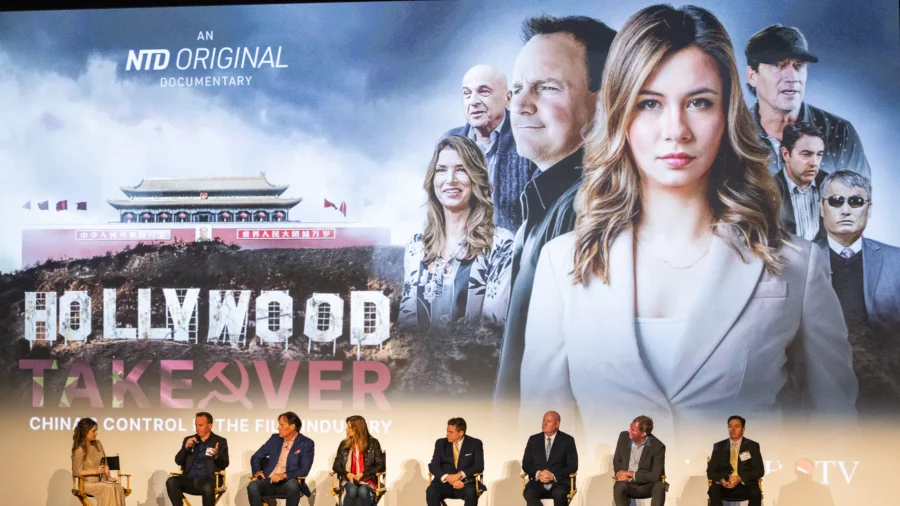HOLLYWOOD, Calif.—The American film industry has cooperated with the Chinese Communist Party (CCP) to gain access to China’s massive market, enabling the CCP to shape the perception of the despotic regime through movies.
This is an intentional strategy to win the battle of public perception through arts and entertainment, a tactic that goes back to the Chinese regime’s first leader, Mao Zedong.
This stark warning of the infiltration of CCP messaging into the U.S. film industry is conveyed through the film “Hollywood Takeover: China’s Control in the Film Industry,” a one-hour documentary produced by NTD, which debuted at the Harmony Gold Theater in Los Angeles on March 6.
Interviews with industry insiders—including producers, actors, and national security experts—outline the history of CCP influence over the content of American films, the implications for American culture, and the steps some filmmakers are taking to reduce the impact.
The Lure of Profit
The crux of the problem, according to film executive Chris Fenton, is that the lure of profit from China’s rapidly growing entertainment market made filmmakers, including himself, susceptible to subtle—then overt—pressure from the CCP to alter some elements of feature films.
That began with seemingly benign changes, such as removing clotheslines from an urban scene set in China to avoid suggesting that Chinese people could not afford clothes dryers. Over time, the nature and scope of the changes escalated to the point that life under communism was elevated and even preferable to American life.
Mr. Fenton, whose credits include blockbuster films such as “Iron Man 3,” describes, among other incidents, how the final scene of the 2012 film “Looper,” starring Joseph Gordon-Levitt, Bruce Willis, and Emily Blunt, was changed from France to China, depicting an idyllic future life under communist rule.
Other films have been altered to depict enemies of the CCP as terrorists, according to filmmaker and activist Jason Jones.
In the 2020 live-action version of Disney’s “Mulan,” the sets were located within sight of concentration camps housing Uyghur people, a persecuted minority in northwestern China, according to Mr. Jones.
“So Disney is making a movie that literally turns the Uyghur into creepy villains,” he told The Epoch Times.
When action star John Cena publicly said in 2021 that Taiwan is a country, the CCP objected. It considers the self-governing island part of its territory. Mr. Cena was forced to issue an apology, which was delivered in Mandarin. “It was the most Orwellian thing I’ve ever seen,” Mr. Jones said.
“What Beijing is trying to do is shape the way we see their system,” he added.
Impact on Culture
The implications of this messaging have already impacted Amercian culture, according to Kevin and Sam Sorbo, who starred in the “Hercules” franchise and have gone on to produce family-oriented entertainment, including the movies “Soul Surfer” and “God’s Not Dead.”
“If you can divorce people from their past, you can control their future,” Mrs. Sorbo said, referring to the increasing absence of historical accuracy in entertainment productions.
“This has been going on long before it hit Hollywood; it hit our schools,” she added. Hollywood has been softened.”
The film’s makers repeatedly pointed out that the CCP views the arts and entertainment as weapons of war.

“The Chinese Communists understand that if you control culture, you control politics,” Tiffany Meier told The Epoch Times. Ms. Meier is a producer and presenter of the documentary. She hosts the program “China in Focus” on NTD.
“Communist China actually uses the arts as a weapon, whereas in America, we think of it as a place for creative freedom. This is how they can destroy our country without military means,” Ms. Meier said.
Counterintelligence expert Casey Fleming calls the effort “unrestricted warfare,” which includes the CCP’s efforts to export fentanyl into the United States. Narrative is another of those methods. “It’s cognitive warfare, which includes information warfare,” Mr. Fleming said. That’s what we’re talking about.”
“We’ve got a battle on our hands,” Mr. Sorbo said. “We’ve got to say what we’re not going to do, which is not be intimidated, forced into doing things that are changing the culture of this country.”
Reversing the Tide
Mr. Fenton, who once aggressively sought CCP involvement in film productions as a way to secure higher profits, became increasingly aware of the damage that could be wrought on American culture. He now works with film executives and some in Congress to address the problem.
The answer, he believes, is to have candid conversations and push back on attempts at undue influence in the industry.
“We’re gonna protect the rights of our filmmakers,” he said. “We’re the bastion of creative expression. We need to protect that; otherwise, we wind up working for the state, with the state telling us what we can and can’t produce.”
Mr. Fenton pointed to the growing movement to either ban Chinese-owned TikTok in the United States or force its parent company, ByteDance, to give up its interest in the popular social media app, which experts say is being used as a platform for information warfare.

Consumer choices will also play a part in changing the cultural landscape of the United States, experts say.
“We need people to support these smaller movies with great messages,” Mr. Sorbo said.
Mr. Fleming went further, telling consumers to break economically with China. “Stop buying items from China. Make sure your mutual funds are not invested in China,” he said. “Because China is completely controlled by the Chinese Communist Party.”
The ultimate solution, according to film critic Christian Toto, is for Hollywood to “fall in love with America again” and return to making films that celebrate the best of American life and culture.
“The Chinese model is very aggressive in propaganda. I don’t want to see that stateside,” Mr. Toto said. “But we should celebrate the freedoms we have here on screen. Our films can tell the world who we are as a people.”
From The Epoch Times

